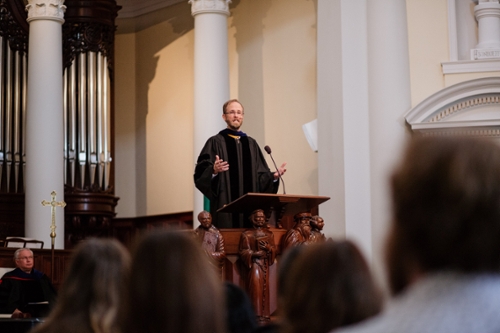
“We are meant to help others align themselves with God’s will and use their gifts in the service of his kingdom work in the world. And at schools like Beeson, we are meant to teach people to serve as laborers in God’s vineyard, primarily by equipping them to serve the church of Christ,” Douglas A. Sweeney stated early in his first opening convocation as Beeson Divinity School’s dean on Tues., Aug 27.
Tuesday marked a new beginning in the school’s 32-year-history as Sweeney became only the second dean to open a new academic year. During his convocation address, he laid out his vision for kingdom leadership, theological education and goals for the school ahead.
“I have a theocentric (God-centered) view of the nature of reality that fuels a missional, collaborative and God-and-neighbor-oriented view of kingdom leadership,” said Sweeney. “Christian leaders are called to help others come to know this God, be reconciled to him through the blood of Jesus Christ, walk in step with his Spirit and advance in Christian discipleship.”
This theocentric view leads to a view of leadership that is characterized by serving others, he continued. This kingdom leadership philosophy extends to deans, too. Kingdom leaders are to serve others and theological education done at its best will serve the church.
“Theological education serves the church, first and foremost,” Sweeney said. “Divinity schools like Beeson train pastors, first and foremost. But insofar as our churches send their young people to Samford, Samford teachers play a role in their formation and discipleship—and Beeson plays a crucial role in supporting that work.”
If Sweeney were to put his vision of theological education into a slogan it would be “the more discipleship, the better.”
“There are many ways to encourage maturation in discipleship, but the best ways are centered on and shaped by the gospel and involve careful study of the Bible,” he said. “Theological education should be characterized above all by prayerful, humble, joyful, diligent, collaborative discipleship for the sake and in the love of God and neighbor.”
As a longtime admirer of Beeson Divinity School and its founding dean Timothy George, he hopes to take the school to the next level in three ways—expand Beeson’s global connections, start new programs for faculty to foster partnerships between disciplines and fundraise for student scholarships and stipends.
“We are especially well-placed—in terms of our culture, our faculty, our staff and other resources—to inspire fellow Christians to more faithful Christian witness, discipleship and service by connecting them to the progress of the gospel in our time. As we do so, I’m convinced, we will excite more Christians about participating in gospel work on campus.”
Sweeney ended his first convocation address by speaking directly to the divinity students.
“Not even M.Div. students, the so-called ‘masters of divinity,’ are meant to master divinity,” the dean said. “You’re to be mastered by divinity, conformed to the mind of Christ.”
“The effectiveness of your ministry is not meant to be based upon your cleverness, your winsomeness, your entrepreneurial skills (as important as they will be). It is meant to be based squarely on the Lord Jesus Christ and the written Word of God.”
Watch the entire address on YouTube.
